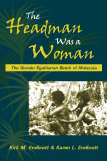“This ethnography is excellent. It deftly engages students while teaching them about the Batek, anthropology, and gender roles. Students enjoy the book.” — Vanessa Hildebrand, Case Western Reserve University
“This is an excellent portrayal of hunters and gatherers in the contemporary world. Endicott & Endicott do a grand job of presenting the political economy of Batek gender egalitarianism and balance their exotic lifeways with a no-nonsense style.” — Alex King, University of Aberdeen
“The accompanying video is a wonderful glimpse into doing ethnographic fieldwork—a great visual to go along with a great book.” — Shanna Cox, University of Wyoming
“I enjoyed the clear and accessible style and presentation. The book is very nicely produced.” — Jerome Lewis, University College London
“This text provides an important argument that students beginning to work on gender from a comparative, global perspective will greatly benefit from.” — Miranda Hallett, Ithaca College
“A smoothly written and engaging account of the way of life of a small indigenous foraging-trading society in Malaysia.” — Sheila Greaves, Athabasca University
“I plan to use this book for my Peoples of Southeast Asia course since it contains some of the most exciting treatments of real life situations for a people with simple technology and an exceedingly practical sense of getting things done so that things work out as best as they can. They treat gender with warmth and insight. Everyone can see how intensely these people confront their environment. The DVD is a substantial enhancement. Students can watch it alone to form opinions and bring in questions and comments for further discussion in a group context.” — David J. Banks, SUNY at Buffalo

163 pages, $26.95 list
1-57766-526-0
978-1-57766-526-7
© 2008
paperback
eBook availability
The Headman Was a Woman
The Gender Egalitarian Batek of Malaysia
A comprehensive ethnography of one of the few remaining hunting and gathering peoples of Southeast Asia, The Headman Was a Woman presents the gender concepts, roles, and relations of the highly egalitarian Batek of Peninsular Malaysia. Based on longtime fieldwork, the book describes the lives of Batek men and women in the tropical rainforest, and includes discussions of fieldwork, hunting and gathering, social organization, religion, gender, nonviolence, and cultural persistence in the face of a changing landscape. Rich in detail yet clearly written, The Headman Was a Woman introduces readers—from first-year anthropology students to hunter-gatherer specialists—to an egalitarian people whose way of life is both thought-provoking and rare.
The text is accompanied by a 37-minute DVD, The Batek: Rainforest Foragers of Kelantan, Malaysia. Footage shows vivid highlights of camp life and social activities as well as all the important economic processes described in the book. Those videos can also be viewed here.
Coverage aligns with topics featured in introductory texts, making this accessible yet authoritatively written ethnography an optimal supplement for classroom use.
The text is accompanied by a 37-minute DVD, The Batek: Rainforest Foragers of Kelantan, Malaysia. Footage shows vivid highlights of camp life and social activities as well as all the important economic processes described in the book. Those videos can also be viewed here.
Coverage aligns with topics featured in introductory texts, making this accessible yet authoritatively written ethnography an optimal supplement for classroom use.
Reactions
1. Encountering the Unexpected
Going to the Batek / Some Surprises / The Idea of Gender Egalitarian Societies / The Batek / The Batek Environment / Earlier Reports on the Batek / Our Fieldwork
2. Batek Views of the Sexes
Gender in Social Classifications / Gender in Origin Stories / Physiology of Gender / Expressions of Gender in Clothing and Body Decoration / Gender in Religion
3. Social Life
The Camp: The Center of Social Life / Ethical Principles of Social Life / Groups / Marriage and Divorce / Platonic Male–Female Interactions / Political System
4. Sharing the Work: The Gender Division of Labor
An Overview of the Batek Economy / Getting Food / Men's and Women's Contributions to the Food Supply / Chores and Crafts / Explaining the Division of Labor
5. Growing Up Batek
Conception, Pregnancy, and Childbirth / Childhood / Adolescence / Parenting / Instilling Batek Values
6. Continuity and Change in Batek Gender
1990: New Conditions, New Responses / Gender Concepts, Roles, and Relations in 1990
7. Understanding Batek Egalitarianism
The Bases of Batek Gender Egalitarianism / Is Batek Culture a Result of Encapsulation?
Appendix: Batek Kinship Terms
Going to the Batek / Some Surprises / The Idea of Gender Egalitarian Societies / The Batek / The Batek Environment / Earlier Reports on the Batek / Our Fieldwork
2. Batek Views of the Sexes
Gender in Social Classifications / Gender in Origin Stories / Physiology of Gender / Expressions of Gender in Clothing and Body Decoration / Gender in Religion
3. Social Life
The Camp: The Center of Social Life / Ethical Principles of Social Life / Groups / Marriage and Divorce / Platonic Male–Female Interactions / Political System
4. Sharing the Work: The Gender Division of Labor
An Overview of the Batek Economy / Getting Food / Men's and Women's Contributions to the Food Supply / Chores and Crafts / Explaining the Division of Labor
5. Growing Up Batek
Conception, Pregnancy, and Childbirth / Childhood / Adolescence / Parenting / Instilling Batek Values
6. Continuity and Change in Batek Gender
1990: New Conditions, New Responses / Gender Concepts, Roles, and Relations in 1990
7. Understanding Batek Egalitarianism
The Bases of Batek Gender Egalitarianism / Is Batek Culture a Result of Encapsulation?
Appendix: Batek Kinship Terms